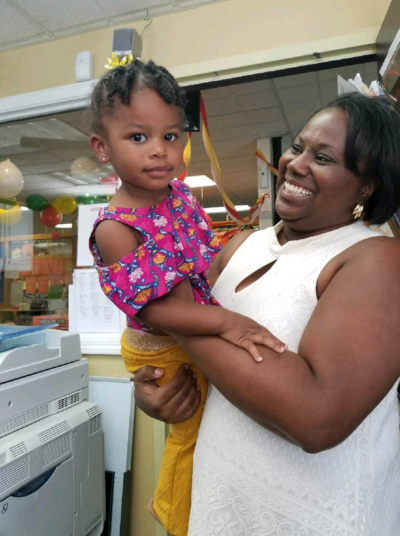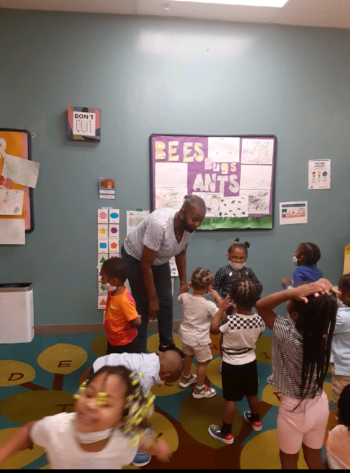Janice L. Bell-Martin, Owner/Executive Director of Under Carrey’s Care in Riverdale, chose a career in daycare due to her love for children and the desire to create opportunities for teachers while supporting the community. Like many private daycare centers, she has experienced challenges due to the state of Illinois’ ongoing childcare budget crisis. She said, “The fear, concern, and discouragement come from knowing how much more we could do if we had a fair budget.” Worsened by the pandemic, the issue calls for immediate attention.
Bell-Martin said that she has not experienced high employee turnover but supports staff who decide to accept other employment. Lack of funding prevents centers from adequately compensating their teachers. A childcare center teacher with a B.A. degree may earn a starting salary of as little as $15 per hour. In contrast, a teacher who works for a school district or a private corporate grant recipient like Easter Seals or Illinois Action for Children could start at $40,000 per year. Centers receive less funding, although they must provide the same early childhood program and meet the same state mandates as schools. Unlike schools, centers also must follow guidelines for the Department of Children and Family Services (DCFS) and meet accreditation requirements for the National Association for the Education of Young Children (NAEYC).

Demand for a level playing field
Malika Cooper, the owner of Children’s Home Centers in Calumet City and Steger, said that it is difficult to compete with the school district for reimbursement per student. Also, it is hard to retain qualified staff due to the lack of resources. She would like to see the same payment for all students across the board. Adequate funding would create job security and eliminate the anxiety that center teachers experience in an unstable work environment. Cooper expressed her lack of optimism that the state will make changes to help keep daycare centers afloat, considering the funding is so low, and it takes so long to receive it. She would like to have accountability and transparency for organizations that offer reimbursement for childcare services to make sure funding is comparable.
Beil-Martin said that if schools can receive funding at the beginning of the school year and have a budget that equates to over $12,000 per student, the same should happen for centers. Fair funding would eliminate the need for parents to cover a portion of the childcare cost and would allow staff to meet educational goals.
Rochelle Golliday, owner of Cuddle Care in Riverdale, faces the uncertainty of being able to recover while trying to reassure parents that it is safe to bring their children back. The state offers some hope during the pandemic by providing short-term assistance for centers to subsidize the loss of income and continue operating with reduced enrollment for safety purposes. For daycares to survive beyond that, Golliday wants access to funding without the facing penalty due to the rules constantly changing.
Jackie Curington, the owner of Academy for Children in Lansing, certainly knows the pandemic’s economic impact. It has put many in a catch-22 situation. Being unemployed has disqualified parents from receiving the childcare subsidy. Without support, they are unable to put their children in daycare. In turn, the lack of childcare affects the parents’ ability to find work. Also, Curington must turn away parents who can pay due to capacity restrictions. During the pandemic, centers continued to pay their staff as instructed and expected to receive assistance for complying. Since they have not received funds, many centers will not make it. Forced to close her Chicago location recently, Curington said that for daycares to survive, the state needs to allow parents more time to meet the employment requirement to receive the childcare subsidy.
State support
 Gov. J.B. Pritzker has acknowledged the discrepancy in early childhood education funding. In late December 2019, Gov. Pritzker formed the Early Childhood Funding Commission to spearhead a year-long project to address childcare funding. The commission has proposed a hefty budget increase, but Bell-Martin wants the state to resolve the issue with childcare centers directly. She would like the funds for early childhood education to go into one pot and distribute them equally based on scores, enrollment needs, and ratings.
Gov. J.B. Pritzker has acknowledged the discrepancy in early childhood education funding. In late December 2019, Gov. Pritzker formed the Early Childhood Funding Commission to spearhead a year-long project to address childcare funding. The commission has proposed a hefty budget increase, but Bell-Martin wants the state to resolve the issue with childcare centers directly. She would like the funds for early childhood education to go into one pot and distribute them equally based on scores, enrollment needs, and ratings.
As part of COVID Crisis Support, Gov. Pritzker’s administration has made sure that daycare centers with existing subsidized childcare contracts will continue to receive a portion of the tuition, even if the children are not in attendance. Additionally, new funds were approved for centers to apply for a grant that would provide additional money to keep them in operation and pay their staff since enrollment is extremely low.
When addressing the childcare budget crisis, it is crucial to be mindful of the potential long-term effects on the children. The little ones should remain at the center of the discussion.
Contributing writer, Donna Montgomery is a Community Affairs/Arts Writer in Chicago. Find her on social media at @GoldenLadyWrites.